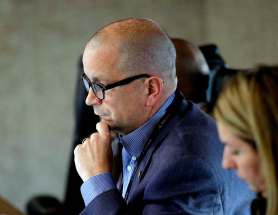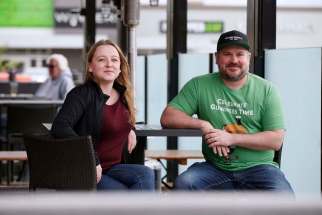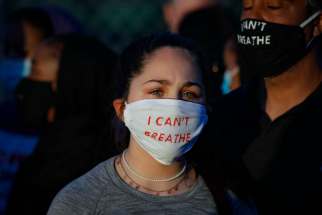Manitoba preparing for COVID-19 antibody search Best to have consistent approach to serological testing countrywide, says province's top doctor
Read this article for free:
or
Already have an account? Log in here »
To continue reading, please subscribe:
Monthly Digital Subscription
$19 $0 for the first 4 weeks*
- Enjoy unlimited reading on winnipegfreepress.com
- Read the E-Edition, our digital replica newspaper
- Access News Break, our award-winning app
- Play interactive puzzles
*No charge for 4 weeks then billed as $19 every four weeks (new subscribers and qualified returning subscribers only). Cancel anytime.
Read unlimited articles for free today:
or
Already have an account? Log in here »
Hey there, time traveller!
This article was published 31/05/2020 (1417 days ago), so information in it may no longer be current.
Manitoba is preparing to test people to see who has COVID-19 antibodies.
The province posted on the Merx website last week a request for bidders to provide the DiaSorin serological test from June 15 to March 31, 2021 “as needed.” Merx is an electronic tendering service that provides suppliers and contractors with one-stop access to thousands of public and private sector tenders from every level of government and Canada’s largest agencies, as well as private and Crown corporations.
Serology tests look for antibodies in blood. If antibodies are found, that means there has been a previous infection. Antibodies are proteins that can fight off infections. Investigations using serology testing are called seroprevalence surveys, according to the Centres for Disease Control website.
Manitoba’s chief public health officer couldn’t say Monday how many serological tests will be conducted, on whom, or when.
“It’s still early on,” said Dr. Brent Roussin. “We’re working nationally to develop an approach for a seroprevalence study.”
In May, Health Canada authorized the first COVID-19 serological test for use in Canada, the DiaSorin Liaison test, for laboratories to use to detect antibodies specific to COVID-19. Canada’s COVID-19 Immunity Task Force announced last month at least one million Canadian blood samples will be collected and tested over the next two years to track the virus in the general population, and in specific groups at greater risk of having been infected, including health-care workers and the elderly.
“It’s still early on. We’re working nationally to develop an approach for a seroprevalence study.”
– Manitoba chief public health officer Dr. Brent Roussin
“It’s best to try to get a consistent approach across the nation because then we’ll have a lot higher numbers to work with to get a better picture of the seroprevalence in Canada,” said Roussin. “We’re certainly ordering those tests, we’re getting prepared to do that, but the details are still pending.”
The seroprevalence study Manitoba is preparing for offers a picture of where the virus is and how many people are infected, said Roussin. “The other use of serology testing is to determine whether there is immunity brought on by infection and how long it lasts and what that might tell us,” said Roussin. That hasn’t been determined yet, he said. “We’re still learning.”
Deciding which groups to test in seroprevalence surveys is important, and testing across Canada needs to be consistent, said Roussin.
“At this point in the seroprevalence study, it’s really important to pick the study groups well, so it’s going to give you a good representative example to extrapolate what proportion of the population has been infected,” he said. “We’re going to want that national approach to determine which cohorts we’re going to test first.”
Health Minister Cameron Friesen said Manitoba is in an “enviable position” when it comes to COVID-19 testing.
The province has some of the broadest parameters for COVID-19 testing in Canada and ramped up testing to more than 800 tests per day this past Saturday and Sunday, the highest number of weekend lab results Friesen said he has seen so far. The province also stepped up its notification of test results. Earlier in the pandemic, a positive test result could take 24 to 48 hours, and those who tested negative would have waited for days for a call confirming they didn’t have the virus. Now a person who tests negative on a Friday can go online and get results within 48 hours.
“It gives us the ability to find people with COVID-19, notify them, send them home and allow the rest of us to continue to interact in our lives,” Friesen said at a news conference Monday.
“Serology will be a very important part of this,” the health minister said. “It will be important for us to know who has had COVID-19 and recovered. There are more testing opportunities coming online. We continue to work well with the federal government and other provinces and territories to understand what the opportunities are.”
A spokeswoman for the province said the materials are being ordered as the province and other jurisdictions prepare for a serosurvey. “Details are not final and are still under discussion, both at the provincial and national levels.”
carol.sanders@freepress.mb.ca

Carol Sanders
Legislature reporter
After 20 years of reporting on the growing diversity of people calling Manitoba home, Carol moved to the legislature bureau in early 2020.
History
Updated on Tuesday, June 2, 2020 11:00 AM CDT: Updates attribution.







